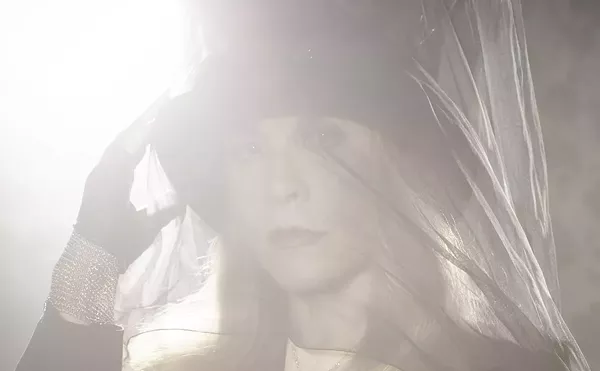"Being on strike, getting divorced, raising my kids, writing a load of songs and" -- here he adopts a mock Vincent Price, threatening tone -- "waiting for the fateful day when I might return and the world will shiver at my name. That kind of thing really," he says, laughing. "Not too much: being ill, working with other people, getting a brand-new record deal, making an album."
The new record deal is with TVT, a small independent label in the United States. Until recently the band hadn't recorded or released any record since 1992's Nonsuch, because it fell prey, according to Partridge, to one of rock 'n' roll's most prevalent cliches: a bad record contract. In signing with Virgin, XTC didn't pay attention to the details because "when you are young, you just want to make music and drink and fuck; that's about as much as you want to do," Partridge says. XTC went "on strike" and got out of its deal with Virgin, but the process kept the band out of circulation for about seven years.
Bands disappear and reunite frequently, and lately the '80s is the decade that refuses to die. Blondie, Bauhaus, and Culture Club are among those who have reunited. Although XTC never broke up, it did stop releasing records. And because the band no longer performs live, XTC dropped from public view for close to a decade (missing alternative's heyday), which raises the question of the band's relevance. XTC's sound operates on a Beatles-Beach Boys axis, independent of the sounds of the moment, but reunions always taint the memory of what bands once were.
At first Partridge dodges the question of relevance, then says thoughtfully, "I don't think we ever were relevant. I don't think we were more relevant than anyone else who makes records. But I don't think any music is relevant, unless it's a backing band at a bar mitzvah. Music, at its best, is kind of an exotic smell. But the word relevancy gives it too much importance. I think any music can be as relevant or as irrelevant as any other music.
"I think most young people attach too much importance to it," he theorizes. "Every young person thinks that their pet group is going to save the world and is speaking with the voice of God. It's only music. It's more to do with the young person looking for their voice than the musician they've grasped. They've put this massive responsibility mentally onto those musicians; it has more to do with the young person not finding their own voice and borrowing one from somebody else."
The new album, Apple Venus Vol. One, reflects Partridge's assessment of the band's relationship to the current music climate; it sounds like a record from a time capsule -- XTC circa 1993. Performed mainly on acoustic instruments and backed by an orchestra, the album is classical pop, "orch-oustic," according to Partridge. That's not to say the record sounds dated; it just sounds as if the band never went away. With Partridge's wry smile of a voice guiding the band, the songs bear the trademark sweet-pop hooks that fans expect.
Though Apple Venus is characterized by the addition of an orchestra, what distinguishes the record from the rest of the XTC catalog is the way in which horns are integrated, a shining counterpoint to the dark tones of the strings and Partridge's frequently caustic lyrics. The band's "orch-oustic" direction is evident from the opening song, "River of Orchids." As the strings hit staccato notes and the brass plays the melody, Partridge's voice comes in over them -- no guitars, no bass, no drums. The orchestra lends a baroqueness elsewhere, particularly on "Easter Theater," in which it provides the primary instrumentation through the first verse, until the band lets loose with all of the instruments it owns. Thrown in are an electric guitar, mellotron, percussion, and brass, but the many individual sounds don't crowd the song. The band may be using the kitchen sink, but the components are kept distinct. What's truly different about Apple Venus are Partridge's sources of inspiration; he finds himself guided more by Rodgers and Hammerstein than Lennon and McCartney.
"I always wanted to work with an orchestra," Partridge says. "I guess the cheesy, light classics that went into my head as a young kid have got to come out somewhere. I used to sit with my head on the radio, just listening for hours and hours. The stuff that impressed me the most was from musicals -- you know, from South Pacific or Oklahoma. That's something I'd actually really like to do: I quite fancy wrestling to the ground a real kind of family-style musical. It's so uncool and unfashionable it's probably the right time to do it as well."
Broadway is a long way from England's postpunk breeding ground from which XTC emerged as an art-rock group. Working as the trio of Partridge, Dave Gregory, and Colin Moulding, they were clever and a bit perfectionist when it came to recording. The semi-hit singles, "Senses Working Overtime," "Dear God," and "The Mayor of Simpleton," from three different records released in the mid-'80s, illuminated the band's ability to wrap packages of solid, semi-nerdish, hook-filled rock in three minutes. That the songs were part of delicious records only added to their appeal.
But when the band began to focus solely on recording, Gregory became disenchanted. His decision to leave XTC during the recording of Apple Venus was the culmination of soured feelings between him and the other band members, according to Partridge. Gregory wanted to tour and be less studio-obsessed, wanted XTC to be more "rock," and didn't want to sign the TVT deal, among other differences.
Explaining that diabetes gave Gregory a "giant chip on his shoulder" and characterizing him as an unbearable bastard, Partridge sounds admittedly callous when discussing how things deteriorated. "I think he had trouble grasping what the group had mutated into over the years and just made himself very unpopular [within the group]," Partridge says. "The weird thing is, after 20 years of being a business accomplice, the second that he left I felt like a million tons had been lifted off my shoulders. That sounds really cruel, but it's true. He sees me as the great Satan; he's never rung me up from the day he left. He has never said a word to me. I just hope he's not going to end up as one of those suicide people."
Still, the band's aversion to touring (Partridge had a breakdown of sorts when faced with the prospect of performing before the release of 1983's Mummer) has kept XTC from promotional opportunities and attracting large audiences in the United States. Though he rationalizes his reasons for not touring, Partridge admits that even the thought of getting on stage "stresses me out."
"[Even] if I didn't have the panic attacks, I think it would fill me with horror to stand on a stage and say, 'You're a great audience.' I just know I would be a lying bastard and not interested in them being an audience," he explains. "I would much rather they queued up one at time, bought the record, took it home and experienced it for themselves at home.
"I never understood it. If you make a film, you don't have to climb on a stage and say, 'I'm going to show you how we filmed scenes one through nine and then do a little editing for you. You're a great audience.'" He laughs and grows increasingly animated. "Why do you need to see me? I made a record, that's what I made, that's what I am -- I'm that record. Nothing I do with my body in front of your eyes will be one-millionth as good as that record was. Isn't the record good enough?!








